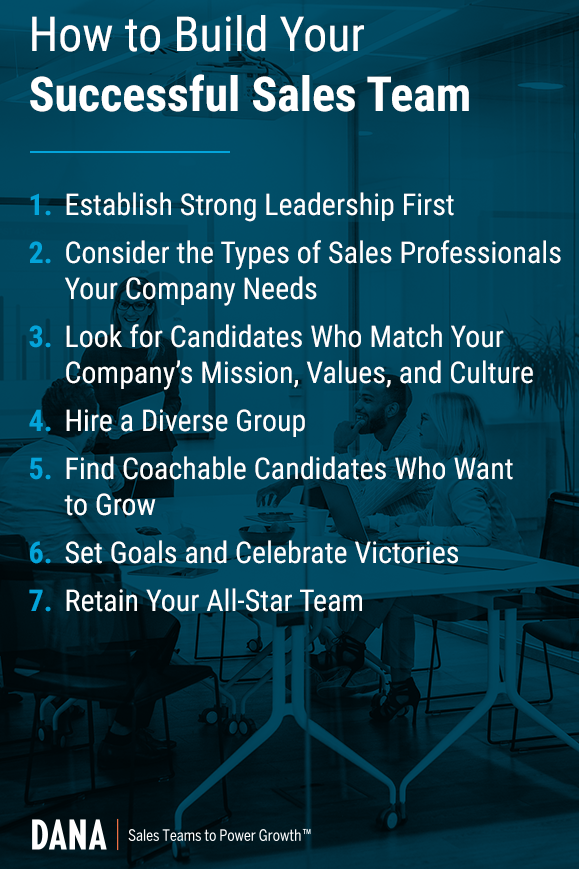
Your company’s success depends on more than the solutions you provide or the services you offer. Behind every standout company is an exceptional sales team that connects with potential clients and closes deals. Building a winning sales team involves more than hiring people, giving them a pitch script, and hoping for the best. Sales teams that thrive have a distinct mission, a set of shared goals, seamless communication, and a clear process to drive high performance. You need to find the right combination of people for a hardworking team, starting from the top.
Whether you are creating a new sales team for a start-up venture or reinvigorating a stagnating one, you can take concrete steps toward ensuring you have a killer sales team built for impact.
Make a Plan. Assess Your Goals for Building Out the Sales Team.
Before you can start building or expanding your sales team, look critically at where you are and what you need. Asking important questions like:
- What is the best structure and composition of the sales team to support company goals?
- What performance criteria will set the sales organization up for success?
- What specific traits will make a successful sales team?
Here is how to assess your team to see if it is what your company needs:
Determine what your sales force does for the company.
Sure, the obvious answer is to close sales. But are your sales reps the only group responsible for driving revenue? Your objective for the sales team might be to close net-new business, while account managers handle retention and expansion. Start-ups, given their stage of business, typically hire key salespeople who can drive the complete sales cycle, from lead generation to closing to up-selling to managing the ongoing customer relationship. Evaluating what type of sales infrastructure will best support your company’s goals is a critical starting point.
Compare current performance to expectations and requirements:
Measure how current members of your sales team are performing and compare that to your business goals and expectations for generating revenue. If you are just starting up, think about these metrics as you establish your team. One metric to consider is the Opportunity-to-Win ratio. This tracks the win rate of your sales team per opportunity over a given time period. Another key metric is conversion rate, which is the number of new customers closed divided by the number of leads. You can use this and a range of other metrics to analyze performance for individuals and the teams such as: number of new logos, average deal size, average length of sales cycle, and time your reps spend in each stage of the pipeline.
Evaluate weak spots:
If you have a team in place, analyze areas where your salespeople appear to be struggling. Ask them directly as well. You know the old adage, “we are only as strong as our weakest link.” Identifying weak spots can reveal where you might add to, or restructure, the team. Your reps could do an excellent job of bringing in leads but struggle to close them. They may be leaving money on the table, not able to maximize revenue potential from each customer. Or they could be working in a silo and not be effective cross-functionally. Pinpointing gaps and challenges will inform the best approach for addressing the issues.

How to Build Your Successful Sales Team
After assessing your needs and where you are with your current sales organization, focus on creating a sales team development plan. The steps below will help provide a framework for your plan.

1. Establish Strong Leadership First
Behind every successful team is a strong, capable leader. Your team members need a leader whose guidance steers them toward becoming competent and confident in their roles. Whether they are in executive-level or middle management positions, or changing careers, leaders have several qualities and traits in common.
Top leaders need to be top communicators. They must be able to set clear and specific expectations as well as motivate and inspire the team to excel. The best sales leaders are target and deadline driven and hold their team to a high level of accountability, yet they create an environment where sales team members want to continually improve themselves.
Other traits that define talented leaders include:

- Engaging personality: Leaders tend to draw others toward them, in part because they have vibrant personalities. Their actions and attitudes inspire and model for others to achieve better performance.
- Emotional intelligence: People with high emotional intelligence can recognize and respond to the emotions of others. They use their understanding of human nature to communicate, empathize, and guide their team toward goals and make constructive adjustments as needed.
- Clear, Strong decision-making: In times of stress or significant pressure, leaders are decisive. They can make clear action plans without engaging in excessive back and forth or worrying about making the wrong choices.
- Focus on quality: The best leaders commit to excellence in all they do and will strive to make sure their work is always the highest quality. Do not confuse a focus on quality with perfectionism, though. A leader wants their team to do great work but will not let striving for excellence delay projects or steer a team off-course.
- Growth mindset: Excellent leaders are always looking for ways to grow and improve. They are open to brainstorming, input, and feedback from other company executives and sales team members.
2. Consider the Types of Sales Professionals Your Company Needs
The roles you need to fill will vary based on your company’s current stage. The needs of a startup sales team can be considerably different from those of a mid-stage company. Your team members’ experience level, skills and specialization will also evolve as your company grows and changes.
There is no one-size-fits-all solution for hiring a sales team. Roles and responsibilities that work well for one company size or type might not be the right option for another business of similar size or type. Focus on the specific needs and goals of your business when hiring. DANA Associates works diligently to understand each client in depth, enabling us to recommend which positions are right for your company’s current growth stage and needs.
When learning how to develop and manage a sales team, consider the category your organization fits into:
- Early Stage Start-up companies: Building a customer base and establishing cash flow is critical. There is higher risk as you launch and establish the business. For this stage of business, a top sales all-star will put your company on the map.
- Growth Stage companies: With a proven product in market, growing and trying to scale fast are priorities. Your business needs agility as strategic priorities continue to shift. For this type of business, a player/coach could be the best investment. These best all-around performers can pursue leads and close deals while hiring, training, managing, and motivating a growing sales team.
- Mid/Later-stage companies: A company that is more established with an existing customer base wants to ensure customer retention and upselling in addition to closing net-new business. They are looking to improve operational and sales efficiency. For these organizations, hiring a CRO or VP of sales to lead overall strategy and organize a team of senior account executives and account managers could be the right move.
Size is another consideration when determining the composition of your sales team. Many companies, particularly those in the early stages, err on the side of low head count and do not maximize their net-new business prospecting with enough salespeople to meet their growth goals. Consider your company’s available market opportunity when deciding how many members to add to the team.
We can’t stress enough to keep an open mind regarding the positions you hire for. While a sales manager might make sense for a competitor that is about the same size and stage as your business, a sales manager might not be the right position for you to add to the team at this time. If you are flexible and open to various options, you are more likely to choose roles and create a sales organization that will benefit your company the most, for the short and long term.
3. Look for Candidates Who Match Your Company’s Mission, Values, and Culture
You can take one of two routes when building your sales team. You can let the people you hire shape your company’s mission and values, or you can find people who fit the mission and values you have worked hard to establish. The ideal candidates will reflect your company’s ethos. The best hires perpetuate who you are and who you want to be and are highly motivated to be successful and drive success for your company.
To find someone who is a good fit for your values and company culture, you need to look beyond their accomplishments. Zero in on who a candidate really is as a person in addition to focusing on what they have accomplished in previous roles.
DANA believes people should come first when assessing a candidate’s overall fit for a company. The best way to genuinely get to know candidates, the whole person, is to sit down with them face-to-face over several interviews. After more than 50,000 in-person interviews, we have developed a method, and a keen sensibility, for discovering candidates’ motivations, strengths, and personal and professional goals.

Before you can hire salespeople who match your company’s values, mission and culture, you need to articulate them clearly. Some businesses consider “cultural fit” to mean hiring candidates who will fit in well at company-wide social events. But there is much more to a good cultural fit than being a good happy hour participant.
Simply put, candidates who fit in with a company’s culture are highly effective at their jobs. If the workplace is a bustling, collaborative open office setting where constant communication and group ideation is integral to success, then the individual must be able to contribute and perform in that environment. If the culture is more hierarchical or subdued, where employees are not encouraged to challenge but adhere to process and procedure, then a different type of candidate would be effective working in this kind of culture. You may value collaboration and a tight culture where everyone is family and have a lot in common. Or you may value agility and innovation bar none, where driving change and risk-taking embody your company culture.
Whatever your mission, vision, and core values are, if you have not developed them fully as part of your company’s workplace north star, now is a good time to start. It is best practice for defining your company’s direction and your hiring goals. Start-ups and established companies alike use this brand strategy roadmap.
When you find candidates who match the values that your company values, you will likely find those hires stick around, growing and developing in tandem with, and enhancing, your business. An employee who aligns with your company’s mission will be far more rewarding than one driven purely by the desire to make money.
4. Hire a Diverse Group
Look for diverse skill sets and work experiences when hiring new members of your sales team. Sure, it seems easy and logical to want to hire people with the same industry experience. But when you hire a sales all-star from an unrelated industry, you can get a fresh perspective, new energy, and most likely some new strategies and techniques to close deals. The more well-rounded and diverse your team, the better equipped they are to challenge and support each other and find new solutions to problems.
Do not shy away from hiring people with a range of experience levels, either. A candidate with deeper experience can be the ideal mentor or team lead for individuals who are just starting their sales careers. When you have a team with a diversity of voices and experience working toward the same goal, your company will be more likely to thrive.
Keeping yourself open to hiring a wider range of salespeople could also be just the secret ingredient you need to set yourself apart from the competition.

5. Find Coachable Candidates Who Want to Grow
Who would you rather work with—a candidate who wants to learn and grow or someone who is set in their ways? The answer may be obvious but hiring talent who inherently strive for improvement can be more challenging than hiring decision-makers realize.
Candidates with a fixed mindset see little or no reason to change. “They are who they are,” and are unlikely to pursue ways to develop themselves or learn from others. They prefer to stick with approaches and tasks they know have worked in the past rather than trying new solutions. They are also likely to believe the people they are working with are unlikely to develop or change. Employees who work under leaders with a fixed mindset can quickly begin to feel stifled or limited on the job.
How do you discover if a candidate is motivated to grow and respond to feedback and coaching? Some clear signs include being open to new ideas and seeking out situations to experiment. Failure even is an opportunity to grow. When a candidate demonstrates an ongoing passion for what they do and a willingness to adapt and evolve, it is a clear indication of their growth mindset. Growth-focused individuals talk about what they are learning and have examples at the ready of projects they have pursued, tested, or are interested in starting.
Coachable candidates will also invest themselves in setting and working toward goals. They relish the opportunity to sit to discuss their ideas and objectives. Highly coachable people often become great coaches themselves. They understand how to get the most out of the feedback process and what techniques are most effective for employee development.

6. Set Goals and Celebrate Victories
A motivated sales team will sell more, increase retention, and boost the value of individual sales. By leveraging effective sales team management tips, you will find numerous ways to motivate your team to do its best. It may be the power of specialization or working one-on-one with each sales rep to create laser-focused goals. Determine the most effective ways to meet those goals and keep your team engaged. Focus on the strengths and weaknesses of each member of your team (here, a sales manager would be highly valuable) to transform performance.
When people reach their goals, reward them! Foster an environment where people are celebrated for reaching or surpassing their quotas. Cash bonuses are one way to recognize accomplishing milestones. Public acknowledgement at team meetings, company outings or in the company newsletter can also be great ways to validate and motivate team members. Simple rewards such as a workplace pizza party or coffee and donuts can work surprisingly well too. Celebrate victories big and small!
Adding some friendly competition to the mix cannot hurt, either. You can introduce a leaderboard, posting sales numbers for each team member weekly or monthly. Or, you can have various internal sales teams compete for a monthly cash bonus or an additional day of paid time off.
Motivating your team does more than encourage them to succeed in their roles. It also engenders loyalty to your company, making the decision to leave extremely difficult. When people are recognized and rewarded for hard work, they feel appreciated and happier in their roles. Happier employees invest more of themselves, in the success of your business, and your company culture.

7. Retain Your All-Star Team
Once you have found the right people to join your sales team, provide enough incentive for them to stay for the long run. It costs more to acquire and ramp up a new employee than to hold on to a top performer. It affects not only your culture, but your company’s bottom line.
Having a high employee retention rate helps you save money and improve your reputation. When prospects, clients, business partners or candidates learn that employees have remained at your company for years, they typically conclude there is something very special here.
Encouraging employees to stay with your company is directly tied to ensuring they receive compensation that matches their experience and skill level and aligns with market rates. DANA not only finds your company highly qualified candidates for sales leadership positions, but we regularly advise on creating the most compelling compensation packages to candidates to come onboard and remain long term.

Avoid Common Mistakes
Hiring blunders can cost your company dearly. Here are some common mistakes to avoid falling into the trap of making a bad hire:
- Do not hire simply to check a box: Time is of the essence. We know. Open roles mean lost revenue. BUT avoid hiring someone without serious due diligence just to fill a slot and be done with the task. It will only create more work, take more time, hurt the team, and cost more in the long run. If you do not have time or the expertise, particularly in sales, consider working with a recruiter.
- Do not create a company culture of fear: Fear is never an effective motivator. Your team will be more willing to work and be more engaged when they feel supported and uplifted. Plus, beware of social media and other outlets where public exposure is quick and viral. You won’t get very far.
- Do not underestimate the importance of sales enablement: Sales enablement refers to the tools you provide your team to ensure their success. These tools can be tech tools like your CRM or training and continuing education and dedicated mentoring. Sales enablement consists of anything that helps your team do their jobs as effectively and efficiently as possible, including game-changing support that comes with hiring top-quality leadership.

What Makes a Successful Sales Team? Exceptional Leadership
A successful sales team starts with high-quality leaders. If you are building your sales team from the ground up or bringing on a director of sales or VP to take the team in a new direction, DANA Associates will find you the most highly qualified prospective employees. We specialize in finding the right people to fill upper-level sales positions, and we have a reputation as one of the best sales headhunters in the Northeast. To learn more about our in-depth, personalized process, schedule an introductory call today.

